|
|
|
Sort Order |
|
|
|
Items / Page
|
|
|
|
|
|
|
| Srl | Item |
| 1 |
ID:
168956
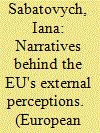

|
|
|
|
|
| Summary/Abstract |
The EU's normative promotion is a keystone in the arch of its Foreign and Security Policy, reflected in establishing a “ring of friends” in its neighbourhood. However, the EU's normative impact in these countries is often hindered by domestic constraints. Conversely, deeper socialisation through persuasion and “learning” may advance towards the promotion of EU norms better. By tracing the “learning” component of the EU's external perceptions in its Eastern (Ukraine) and Southern (Israel and Palestine) neighbourhoods, this paper elaborates upon the receptiveness of EU norms. Considering the specific attention that the ENP draws towards the support of civil society, this paper focuses on “learning” narratives of EU norms among civil society elites in Ukraine, Israel and Palestine as the key targets of EU assistance – with a particular focus on various conceptualisations of learning in the learning process. Notwithstanding perceptions of the EU as a normative power, we find that the learning processes remain too complex to be captured within a single theoretical framework. Whereas communicative rationality implies learning about each other's identities through rational arguing, our analysis demonstrates that identity performance is one of the most emotive and crucial factors in perceptions of learning.
|
|
|
|
|
|
|
|
|
|
|
|
|
|
|
|
| 2 |
ID:
168955
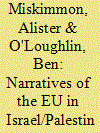

|
|
|
|
|
| Summary/Abstract |
Analysis of narrative can help identify the expectations actors hold about each other in international relations. This article triangulates a mix of elite interviews, media content analysis and an original Q-sort public opinion methodology to map the presence of narratives about EU relations among young Israelis and Palestinians. Our aim is not to explain the effects of EU public diplomacy in these countries. Instead we aim to identify the narrative “terrain” or conditions that the EU communicates to and with and, drawing on feminist and everyday narrative studies, to examine the role of affect and identity to explain why some narratives are more “sticky” than others in those societies. We find, first, a broad recognition that the EU’s capacity to act in international relations is necessary but limited in the face of greater challenges in the international system, and indeed, within the EU itself. We find, second, little evidence that young people radically reshape the narratives they encounter in their public spheres, but nevertheless some important divisions emerge that pose problems for how EU policymakers can communicate consistently without dismaying some citizens in third countries.
|
|
|
|
|
|
|
|
|
|
|
|
|
|
|
|
| 3 |
ID:
168957
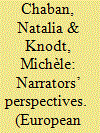

|
|
|
|
|
| Summary/Abstract |
The role of newsmakers as intermediaries in the shaping of external perceptions and reception of narratives advanced by different actors remains sparse in EU studies. This contribution fills this gap and addresses the personal images of the EU of newsmakers. We contribute to the understanding of those personal perceptions and their link to professional values of audience interest, newsworthiness and objectivity in reporting the EU. The article will demonstrate that all journalists perceive EU coverage in their respective locations are led by local priorities. Negative views of the EU as a weakening, biased, ineffective, elitist and arrogant actor are dominant. Arguably, they create conditions for the birth and dissemination of Euro-distant and even Euro-sceptic media narratives. The article will explain why this is the case while drawing on political/ideational and business/financial explanations.
|
|
|
|
|
|
|
|
|
|
|
|
|
|
|
|
| 4 |
ID:
168960
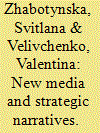

|
|
|
|
|
| Summary/Abstract |
This article analyses two confronting narratives authored by Ukrainian and Russian bloggers who reported the Dutch referendum held on 6 March 2016, and discussed Dutch citizens’ referendum vote on the Ukraine–EU Association Agreement. The considered narratives, addressed to the Ukrainian and Russian audiences respectively, are viewed as strategic because they specifically portray political actors of the referendum “drama” – the Netherlands, the European Union (EU), Ukraine and Russia. These actors are significant participants of European international relations, and their perceptions of one another are important for European security at the present time of critical diplomacy. In this paper, information about the DUTCH REFERENDUM obtained from the new media texts is regarded as a narrative-based political concept (NBPC). It is argued that this concept has different versions, or images that reflect the narrators’ biased perceptions imposed upon the public. Identification and comparison of such images require a particular methodology. Therefore, the objective of this paper is two-fold: to expose the two confronting versions of a strategically relevant political image, and to develop an authentic, interdisciplinary methodology for its analysis. The proposed methodology is informed by the ontology theory employed in cognitive science and cognitive linguistics.
|
|
|
|
|
|
|
|
|
|
|
|
|
|
|
|
| 5 |
ID:
168954
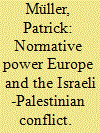

|
|
|
|
|
| Summary/Abstract |
This article conceives the EU’s normative power in the Israeli-Palestinian conflict as a narrative that projects views of the international system, the EU’s identity as a peacebuilder, and its positions on specific conflict issues. Highlighting the importance of local narratives as cultural filters, this article argues that a high degree of alignment of local narratives with key elements of the EU’s normative power narrative facilitates positive images of the EU as a normative power in peacebuilding, whilst diverging local narratives tend to give rise to more critical views. Yet, the case of Palestine also shows that strong narrative alignment with the EU may encourage high expectations, resulting in critical views about inconsistencies between the EU’s normative aspirations and its actual foreign policy conduct.
|
|
|
|
|
|
|
|
|
|
|
|
|
|
|
|
| 6 |
ID:
168958
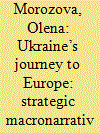

|
|
|
|
|
| Summary/Abstract |
Informed by strategic narrative theorisation and cognitive metaphor theory refined and expanded, this paper analyses textual and pictorial instantiations of cognitive metaphors used to describe and explain the trajectory of Ukraine’s development and form a particular narrative of this movement. Both narrative and cognitive metaphor are considered as tools for navigating experience and serving to construe its subjective images. The study focuses on the ways these tools were used by Ukrainian print media (eight influential outlets) in 2016. The outcomes demonstrate how a coherent strategic macronarrative of Ukraine’s course of development emerges from metaphoric images that survive semiotic mode changes, alternating between textual and pictorial. The macronarrative is that of Ukraine on a hero’s journey towards the European Union – a journey with political and economic implications for both Ukraine and the EU.
|
|
|
|
|
|
|
|
|
|
|
|
|
|
|
|
| 7 |
ID:
168959
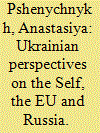

|
|
|
|
|
| Summary/Abstract |
This paper contributes to our understanding of EU-Ukraine relations by examining intersemiotic communication – how words and images, or verbal and photographic semiotic layers and their interaction, combine in the representation of international affairs. The analysis focuses on Ukraine’s perspectives of Self, the EU and Russia as presented in Ukrainian media discourse, namely, in leading Ukrainian social and political newspapers (January-June, 2016). The article presents the results of applying the cognitive theory of perspectives to research the intersemiotic and mental image of Self and Other in four aspects: a vantage point, direction of scanning, perspectival distance, and perspectival mode. Based on that, I explain the main strategic narrative of the Ukrainian press about the EU, how it is sustained, and how the image of the EU becomes pronounced.
|
|
|
|
|
|
|
|
|
|
|
|
|
|
|
|
| 8 |
ID:
168953
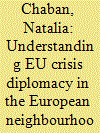

|
|
|
|
|
| Summary/Abstract |
This Special Issue seeks to better understand the role of communication and perception in EU crisis diplomacy. In a recent Special Issue in this journal, Catarina Kinnvall, Ian Manners and Jennifer Mitzen argue that, “ … the greatest security challenge facing people across Europe is not physical, despite the threats of Putin and ISIS, but is a sense of fear and anxiety over their daily lives” [2018. Introduction to 2018 Special Issue of European Security: “Ontological (in)security in the European Union”. European security, 27 (3), 249–265]. We take an interdisciplinary approach to widen the scope of studies on European security and offer new avenues for further research into how citizens in the EU’s neighbourhood understand the security challenges they face and the role the EU plays in addressing these. Through this, we aim to bring theoretical and methodological innovation to understanding the role of the EU as an external actor.
|
|
|
|
|
|
|
|
|
|
|
|
|
|
|
|
| 9 |
ID:
168961
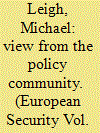

|
|
|
|
|
| Summary/Abstract |
Reflecting on the results presented in articles in this special issue, European leaders should take greater account of external perceptions in crafting the European Union's strategic narrative and guiding its actions. Failure to do so has impaired external policies like the Euro-Mediterranean Partnership, the European Neighbourhood Policy and Eastern Partnership. Leaders emerging from the Arab uprisings perceived the EU as complicit with their countries’ former anciens régimes and Russian leaders see EU support for democracy and the market economy in former Soviet states as duplicitous and instrusive. Awareness of such perceptions should be filtered into EU decision-making, without validating views that European officials and diplomats consider misleading.
|
|
|
|
|
|
|
|
|
|
|
|
|
|
|
|
|
|
|
|
|